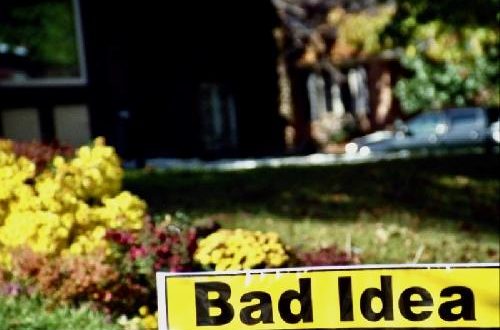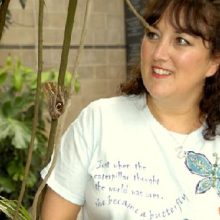Acting out inner process in the world is one of the most common causes of tragic magic. The occurrence of this card may indicate that you and/or someone you are close to are endangered by this tendency.
When I began a six-year Jungian analysis at twenty, I was told to be highly conservative about outer circumstances. This was probably not a good time to change my career, relocate, or upset long-term relationships. Similarly, if you’re going to take a powerful hallucinogen, the sensible advice is to take it in a stable location like your house and not relocate till you’ve come down from it. If, instead, you start acting out your trip in the world — running naked through the streets, driving a vehicle, etc. —- you put yourself and others in danger.
People do it all the time, but it is almost never wise to impulsively spill out inner process, especially if it is volatile, into the world. As Gandalf tells Frodo, “Keep it secret. Keep it safe.”
Acting out inner process in the world —- impulsively relocating, quitting your job without notice, going on a bender -—is rarely a wise course of action.
Jung had a “fallow” period after the break with Freud from 1913-17 or 18, where he was frequently overwhelmed by inner visions and a need to relate to his own unconscious. People around him thought he was having a psychotic break or might even be schizophrenic, though he was outwardly functional and stable. Jung himself said he was “menaced by a psychosis” during this time. Unlike Freud, who was the only financial support of his extended family, Jung could afford some time off because he had married the second wealthiest woman in Switzerland. During this fallow period, Jung made many of his greatest discoveries. He engaged with this content in the creative process, working on his Liber Novus (Red Book), where he documented in art and words encounters with the beings he experienced emerging from the unconscious. He explored the depths of the unconscious fearlessly and, at the same time, kept up his adult responsibilities.
According to Wikipedia:
“During the years Jung engaged with his “nocturnal work” on Liber Novus, he continued to function in his daytime activities without apparent impairment. He maintained a busy professional practice, seeing, on average, five patients a day. He carried out research, lectured, wrote, and remained active in professional associations. Throughout this period, he also served as an officer in the Swiss army and was on active duty for several extended periods between 1914 and 1918 during World War I.”
In February of 1995, I had a series of shocking paranormal experiences, including a dreamtime encounter that caused me to realize overnight I had to leave my tenured teaching job in the highest-paying county for public school teachers in the USA. But, and this is a very important but, I did not just walk off the job. I had a responsibility to my students and colleagues to finish the term, and I did, though I was under extreme stress. I also obtained a one-year leave of absence to reflect on whether I should leave teaching. This is described in my most autobiographical work, The Path of the Numinous—Living and Working with the Creative Muse.
Then, from December 4 of 2017, to April 6 of 2020, I took two years and four months off from work on Parallel Journeys and entered my “rabbit-hole writing” years, relating to the beings emerging from my unconscious and exploring strange zones. These explorations took the form of daily marathon writing sessions that sometimes lasted eighteen hours. I had recently inherited money and could afford to do this, and I did not become notably dysfunctional with relationships or practical matters. I fully engaged with inner process but in the safety of my study or the writing lab in the back of my Sprinter van on road trips. I “acted out” all sorts of transgressive visions and dialogues in free writing sessions, producing thousands of pages of private writings I would later draw from to create things I could share. I did not, however, allow my inner process to cause my outer life to fall into chaos or create problems for others.
If inner process causes you to break social contracts, like the one that ethically bound me not to abandon my students mid-term, that’s a huge red flag. If your inner process is causing you to become dysfunctional, tell it to back off. Focus on practicalities and get back to it when you can. It is one thing to explore the unconscious (which takes both creativity and courage); it is quite another to allow yourself to be ruled by the unconscious and become its plaything, acting it out in the world. To do so would be a tragic failure of exploration and integration.
A creative person needs the right combination of structure and anti-structure. By structuring many of my disciplines—- ensuring as stable a sleep cycle as possible, eating a healthy diet, doing daily cardio workouts, and not neglecting relationships and practical affairs -— I can be much more powerfully anti-structural during my morning creative sessions, going anywhere the muse leads me.
If, instead, I decided to explore the unconscious by breaking all the structures of my life and becoming a homeless wanderer, I would lose my opportunities for anti-structural creativity. Also, my anti-structural creativity is empowered by all the taught and self-taught education and training in writing and other skills I’ve been blessed with. These structured resources help me effectively create works I can share.
If you want to be an explorer of jungles, the ocean, outer space, or the unconscious, you need far more discipline and training than the average person. Sometimes, you may have to go it alone, but if you have a support system of spiritual allies who can help you maintain your grounding (especially by challenging your ideas and reality-testing), you are far less likely to get lost and disoriented. You need structure and support to explore unknown regions effectively.
The most common way people act out inner process is by inter-personalizing intra-psychic instability. Instead of recognizing they are in conflict with their own shadow, they pick a fight with another person and cancel them rather than face their own darkness.
Many love drama and, lacking self-control, turn their inner process into interpersonal dramas, sucking others into their vortex of instability.
Boundaries are important between what and who is inside and outside. You can’t live without skin or an immune system that function as boundaries between the inside and outside of your body. Many foolishly assume that “letting it out” is better than “holding it in.” Why? Is it better to let blood out or to hold it in? And if you check today’s headlines, you’ll see that acting out inner process often results in spilling blood.
Withholding from making major life moves until you have achieved a calm and compassionate inner state can greatly reduce suffering for yourself and others.
When satellites start acting erratically, ground control will put them in “safe mode” –- a state of reduced basic functioning -— while they diagnose and take corrective measures. I do this for myself when my process is volatile. I don’t text, call, or talk to anyone about anything controversial because I realize my judgment and sense of proportion are unreliable. In safe mode, however, I can reliably do the dishes, laundry, and other practical tasks. I will work on inner process by journaling. I might dramatize an intrapsychic process with active imagination and turn it into dialogue or drama in writing. This is not only a safer way to act out inner process, but a more powerful method. I get to the authentic core of what’s really going on and at the source — within. Even if it’s in the context of an interpersonal conflict initiated by another, I need to work on my own inner equilibrium before I can respond ethically and effectively.
Your influence on another who is acting out their inner process is typically quite limited. Often, the best thing is to lovingly withdraw energy from them and not contribute fuel (money, emotion, excess attention) to the acting out. Gently, but firmly refuse to become a character in the drama they seek to create in the world. Be a source of stability and calm and encourage them to ground themselves by taking only the actions that will fulfill their needs.
If you want to explore the esoteric, mysteries, and the personal and collective unconscious, you need a strong moral purpose and behavioral guidelines so that you don’t become possessed by such powerful contents and start acting erratically in the world. Similarly, when Odysseus wanted to hear the Sirens, whose songs would cause sailors to jump overboard and drown, he had every crew member except himself put beeswax in their ears. He then had himself tied to the mast of the ship and gave orders that no one was to untie him, even if he begged for release until they had cleared the Sirens.

John Williams Waterhouse Ulysses and the Sirens 1891, oil on canvas, National Gallery of Victoria, Australia.
Contain your inner process, working on it within or with the most trusted spiritual allies. It’s dangerous to be a sleepwalker acting out your unconscious in the world. Have the courage to face inner process at the source -— within.
 ZapOracle.com home to the free 720-card Zap Oracle
ZapOracle.com home to the free 720-card Zap Oracle






